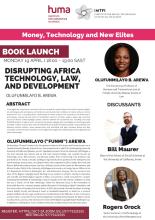Reflection Piece on the 7th Lecture of the Afronomicslaw Academic Forum delivered by Prof Carmen Gonzalez
This blog piece is a reflection on the core arguments from Professor Gonzalez’s lecture. Notably, Professor Gonzalez explored the relationship between environmental degradation and human economic activity. Within this general theme, Professor Gonzalez discussed the link between human economic activity, climate change, capitalism, colonialism and its aftermath, and modernity. This piece will also evaluate Professor Gonzalez’s thoughts on how the actions adopted to combat climate change marginalise the Global South and perpetuate further exploitation of fragile ecosystems across the world. Finally, this piece will outline and analyse Professor Gonzalez’s arguments on the current technological advancements to address climate change and their impact in the Global South.

